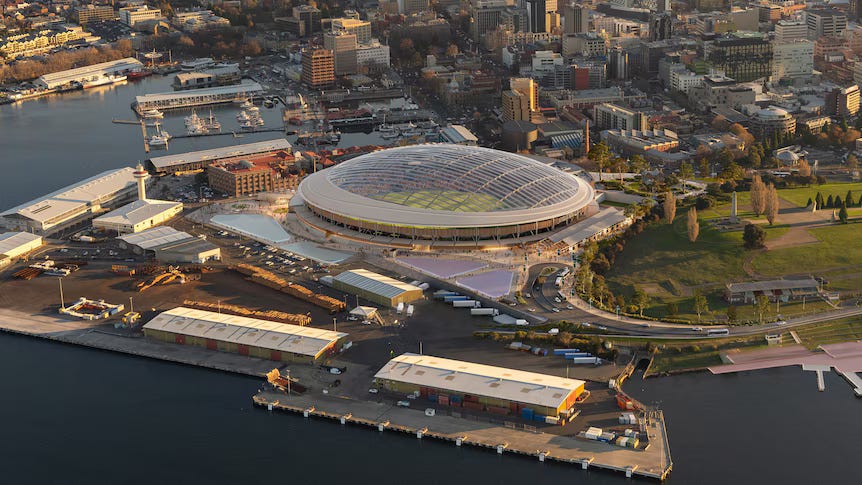Planning Commission Rejects Hobart AFL Stadium Project
Panel finds proposed Macquarie Point facility "too big for the site" as Tasmania's team dreams face major hurdle
Today’s email is brought to you by Empower your podcasting vision with a suite of creative solutions at your fingertips.

The Tasmanian Planning Commission has recommended against proceeding with the proposed Macquarie Point AFL stadium in Hobart, dealing a significant blow to the state's bid for its own AFL teams.
The five-member panel concluded Wednesday that the stadium project should not proceed after a 12-month assessment, finding the benefits are "significantly outweighed by the disbenefits it creates."
"In very simple terms, the stadium is too big for the site and the benefits it will bring are significantly outweighed by the disbenefits it creates," the commission stated in its recommendation report.
The stadium is a contractual requirement under the AFL's agreement with the Tasmanian government for the state to receive its own men's and women's teams. The commission's recommendation, while not legally binding, creates a major obstacle for the project's approval.
Truth matters. Quality journalism costs.
Your subscription to Mencari directly funds the investigative reporting our democracy needs. For less than a coffee per week, you enable our journalists to uncover stories that powerful interests would rather keep hidden. There is no corporate influence involved. No compromises. Just honest journalism when we need it most.
Not ready to be paid subscribe, but appreciate the newsletter ? Grab us a beer or snag the exclusive ad spot at the top of next week's newsletter.
Parliamentary Vote Required
Tasmania's parliament will make the final decision on the project, requiring approval from both houses. The Liberal government and Labor opposition have both supported the stadium, but would need backing from three independents in the upper house to proceed.
The commission's panel, led by Paul Turner SC and including Martin Wallace, Lynn Mason AM, Gary Prattley and Shelley Penn AM, spent months evaluating the project under the state's project of state significance process.
Economic Analysis Raises Concerns
The panel's cost-benefit analysis found the stadium would deliver a benefit-to-cost ratio of less than 0.5, meaning the project would cost taxpayers more than twice what it would return in benefits.
"The Panel has found the ratio of benefits to costs is less than 0.5," the report stated. "This is consistent with other commissioned cost benefit assessments of the stadium and is broadly consistent with the findings of international studies which show minor or modest community benefits from publicly funded stadiums."
The commission noted that a KPMG analysis released in September 2024 showed a base-case benefit cost ratio of 0.69, but stadium construction costs have increased significantly since that study.
The economic benefits from stadium operations would represent "less than 0.1 per cent of Gross State Product and total employment," according to the panel's assessment.
Financial Burden on Households
The report calculated the stadium's construction cost would equate to approximately $5,900 for every Tasmanian household not dependent on Commonwealth income support. Funding the stadium through taxes over its assumed 30-year economic life would require raising state taxes by approximately $50 million annually.
If funded through debt instead of tax increases, the panel projected the stadium would create approximately $1.8 billion in debt after 10 years, assuming a 5 percent borrowing rate and including lifecycle costs, team subsidies and event attraction expenses.
"There will be an ever-increasing debt associated with the stadium because of the compound interest effect, unless taxes are increased, or spending on public services reduced, or other planned state capital projects abandoned, to pay for it," the report warned.
Heritage and Planning Concerns
The commission identified serious concerns about the stadium's impact on Hobart's historic character and urban planning principles.
"The fundamental problem is the size, location and geographical features of the site, in its highly valued context, do not support the disproportionately large, monolithic building proposed," the panel concluded.
The report found the stadium would have "very significant adverse impacts" on heritage sites including the Cenotaph, Royal Engineers Building and buildings along Hunter Street.
"Proceeding with the Project will give rise to irrevocable and unacceptable adverse impacts on Hobart's spatial and landscape character, urban form and historic cultural heritage," the commission stated.
Site Suitability Questions
The panel concluded that Macquarie Point, located near Hobart's CBD and waterfront, lacks the characteristics necessary to accommodate the proposed stadium harmoniously with surrounding buildings.
"The size, shape and location of the site is ill-suited to a building like the stadium – a singular, large, bulky monolith which will overwhelm those surrounding buildings and the setting," the report found.
The commission also noted the stadium would offer "almost no scope for the site to become a vibrant active place that is attractive to visit outside of major event mode."
Planning Framework Concerns
The stadium proposal required approval of a new Macquarie Point Precinct Plan, which the panel found "materially different" from existing development plans that would allow for higher levels of development and activation.
The commission noted the stadium's design represents "a repudiation of a number of long-standing planning principles and strategies" applied to developments in Sullivans Cove.
"It is a building which is incongruent with the valued characteristics of its spatial context, completely at odds with the long-established planning principles guiding and informing development," the panel stated.
Limited Assessment Areas
The commission acknowledged it could not adequately assess some aspects of the project, including Aboriginal heritage materials, Aboriginal cultural values and transport and movement issues.
"For some matters such as Aboriginal heritage materials, Aboriginal cultural values and Transport and movement, the Panel was not able to adequately assess the issues or effects related to the Project," the report noted.
Where issues like traffic, parking and environmental effects can be managed, the panel said this would require "careful management and adequate time and resourcing."
The commission's recommendation now goes to parliament for final consideration. Both major parties have previously supported the stadium project, but the detailed critique from the planning panel may influence the debate among upper house crossbench members whose votes are crucial for approval.
The AFL has made the stadium a non-negotiable requirement for Tasmania to receive its 19th and 20th teams, with the league having committed to the arrangement through its licensing agreement with the state government.
Without parliamentary approval for the stadium, Tasmania's hopes of joining the AFL as a standalone state would face significant uncertainty, potentially affecting the future of the proposed teams and associated infrastructure investments.
Sustaining Mencari Requires Your Support
Independent journalism costs money. Help us continue delivering in-depth investigations and unfiltered commentary on the world's real stories. Your financial contribution enables thorough investigative work and thoughtful analysis, all supported by a dedicated community committed to accuracy and transparency.
Subscribe today to unlock our full archive of investigative reporting and fearless analysis. Subscribing to independent media outlets represents more than just information consumption—it embodies a commitment to factual reporting.
As well as knowing you’re keeping Mencari (Australia) alive, you’ll also get:
Get breaking news AS IT HAPPENS - Gain instant access to our real-time coverage and analysis when major stories break, keeping you ahead of the curve
Unlock our COMPLETE content library - Enjoy unlimited access to every newsletter, podcast episode, and exclusive archive—all seamlessly available in your favorite podcast apps.
Join the conversation that matters - Be part of our vibrant community with full commenting privileges on all content, directly supporting The Evening Post (Australia)
Catch up on some of Mencari’s recent stories:
It only takes a minute to help us investigate fearlessly and expose lies and wrongdoing to hold power accountable. Thanks!






